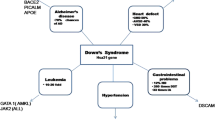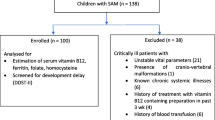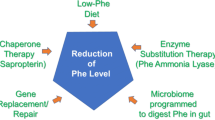Abstract
Background
3-Methylcrotonyl-CoA carboxylase deficiency (3MCCD) is an inborn error of leucine catabolism. Tandem mass spectrometry newborn screening (NBS) programs worldwide confirmed 3MCCD to be the most common organic aciduria and a relatively benign disorder with favorable outcome. In addition, several asymptomatic 3MCCD mothers were initially identified following abnormal screening of their healthy babies and were appropriately termed maternal 3MCCD.
Methods
This is a retrospective study that summarizes all the clinical, biochemical, and genetic data collected by questionnaires of all 3MCCD individuals that were identified by the extended Israeli NBS program since its introduction in 2009 including maternal 3MCCD cases.
Results
A total of 36 3MCCD subjects were diagnosed within the 50-month study period; 16 were classified primary and 20 maternal cases. Four additional 3MCCD individuals were identified following sibling screening. All maternal 3MCCD cases were asymptomatic except for one mother who manifested childhood hypotonia. Most of the primary 3MCCD individuals were asymptomatic except for two whose condition was also complicated by severe prematurity. Initial dried blood spot (DBS) free carnitine was significantly lower in neonates born to 3MCCD mothers compared with newborns with primary 3MCCD (p = 0.0009). Most of the mutations identified in the MCCC1 and MCCC2 genes were missense, five of them were novel.
Conclusions
Maternal 3MCCD is more common than previously thought and its presence may be initially indicated by low DBS free carnitine levels. Our findings provide additional confirmation of the benign nature of 3MCCD and we suggest to exclude this disorder from NBS programs.
Similar content being viewed by others
References
Arnold GL, Koeberl DD, Matern D et al (2008) A Delphi-based consensus clinical practice protocol for the diagnosis and management of 3-methylcrotonyl CoA carboxylase deficiency. Mol Genet Metab 93:363–370
Arnold GL, Salazar D, Neidich JA et al (2012) Outcome of infants diagnosed with 3-methyl-crotonyl-CoA-carboxylase deficiency by newborn screening. Mol Genet Metab 106(4):439–441
Bannwart C, Wermuth B, Baumgartner R, Suormala T, Wiesmann UN (1992) Isolated biotin-resistant deficiency of 3-methylcrotonyl-CoA carboxylase presenting as a clinically severe form in a newborn with fatal outcome. J Inherit Metab Dis 15:863–868
Baumgartner MR, Almashanu S, Suormala T et al (2001) The molecular basis of human 3- methylcrotonyl-CoA carboxylase deficiency. J Clin Invest 107:495–504
Dantas MF, Suormala T, Randolph A, Coelho D, Fowler B, Valle D, Baumgartner MR (2005) 3-Methylcrotonyl-CoA carboxylase deficiency: mutation analysis in 28 probands, 9 symptomatic and 19 detected by newborn screening. Hum Mutat 26:164
Department of Communal Genetics in Israeli Public Health Care Services Neonatal Screening Program (2012) www.health.gov.il/PublicationsFiles/newborn_2012.pdf, in Hebrew
Elpeleg ON, Havkin S, Barash V, Jakobs C, Glick B, Shalev RS (1992) Familial hypotonia of childhood caused by isolated 3-methylcrotonyl-coenzyme A carboxylase deficiency. J Pediatr 121(3):407–410
Ficicioglu C, Payan I (2006) 3-Methylcrotonyl-CoA carboxylase deficiency: metabolic decompensation in a noncompliant child detected through newborn screening. Pediatrics 118:2555–2556
Gibson KM, Bennett MJ, Naylor EW, Morton DH (1998) 3-Methylcrotonyl- coenzyme A carboxylase deficiency in Amish/Mennonite adults identified by detection of increased acylcarnitines in blood spots of their children. J Pediatr 132:519–523
Gong LF, Ye J, Han LS et al (2013) Clinical and mutational features of maternal 3-methylcrotonyl coenzyme deficiency. Zhonghua Yi Xue Yi Chuan Xue Za Zhi 30(5):574–578, in Chinese
Grunert SC, Stucki M, Morscher RJ et al (2012) 3-methylcrotonyl-CoA carboxylase deficiency: clinical, biochemical, enzymatic and molecular studies in 88 individuals. Orphanet J Rare Dis 7:31
Jung CW, Lee BH, Kim JH et al (2012) Uneventful clinical courses of Korean patients with methylcrotonylglycinuria and their common mutations. J Hum Genet 57:62–64
Koeberl DD, Millington DS, Smith WE et al (2003) Evaluation of 3-methylcrotonyl-CoA carboxylase deficiency detected by tandem mass spectrometry newborn screening. J Inherit Metab Dis 26:25–35
Lam C, Carter JM, Cederbaum SD et al (2013) Analysis of cases of 3-methylcrotonyl CoA carboxylase deficiency in the California newborn screening program reported in the state database. Mol Genet Metab 110:477–483
Layward EM, Tanner MS, Pollitt RJ, Bartlett K (1989) Isolated biotin-resistant 3-methylcrotonyl-CoA carboxylase deficiency presenting as a Reye syndrome-like illness. J Inherit Metab Dis 12(3):339–340
Lee SH, Hong YH (2014) Asymptomatic maternal 3-methylcrotonylglycinuria detected by her unaffected baby’s neonatal screening test. Korean J Pediatr 57(7):329–332
Morscher RJ, Grünert SC, Bürer C et al (2012) A single mutation in MCCC1 or MCCC2 as a potential cause of positive screening for 3-methylcrotonyl-CoA carboxylase deficiency. Mol Genet Metab 105(4):602–606
Thomsen JA, Lund AM, Olesen JH, Mohr M, Rasmussen J (2015) Is L-carnitine supplementation beneficial in 3-methylcrotonyl-CoA carboxylase deficiency? JIMD Rep 21:79–88
Yang L, Yang J, Zhang T et al (2014) Identification of eight novel mutations and transcript analysis of two splicing mutations in Chinese newborns with MCC deficiency. Clin Genet. doi:10.1111/cge.12535
Ye J, Gong L, Han L et al (2014) Follow up and gene mutation analysis in cases suspected as 3-methylcrotonyl-coenzyme A carboxylase deficiency by neonatal screening. Zhonghua Er Ke Za Zhi 52(6):409–414
Zlotogora J (2014) Genetics and genomic medicine in Israel. Mol Genet Genomic Med 2:85–94
Author information
Authors and Affiliations
Corresponding author
Ethics declarations
Conflict of interest
None.
Additional information
Communicated by: Bridget Wilcken
Rights and permissions
About this article
Cite this article
Rips, J., Almashanu, S., Mandel, H. et al. Primary and maternal 3-methylcrotonyl-CoA carboxylase deficiency: insights from the Israel newborn screening program. J Inherit Metab Dis 39, 211–217 (2016). https://doi.org/10.1007/s10545-015-9899-4
Received:
Revised:
Accepted:
Published:
Issue Date:
DOI: https://doi.org/10.1007/s10545-015-9899-4




